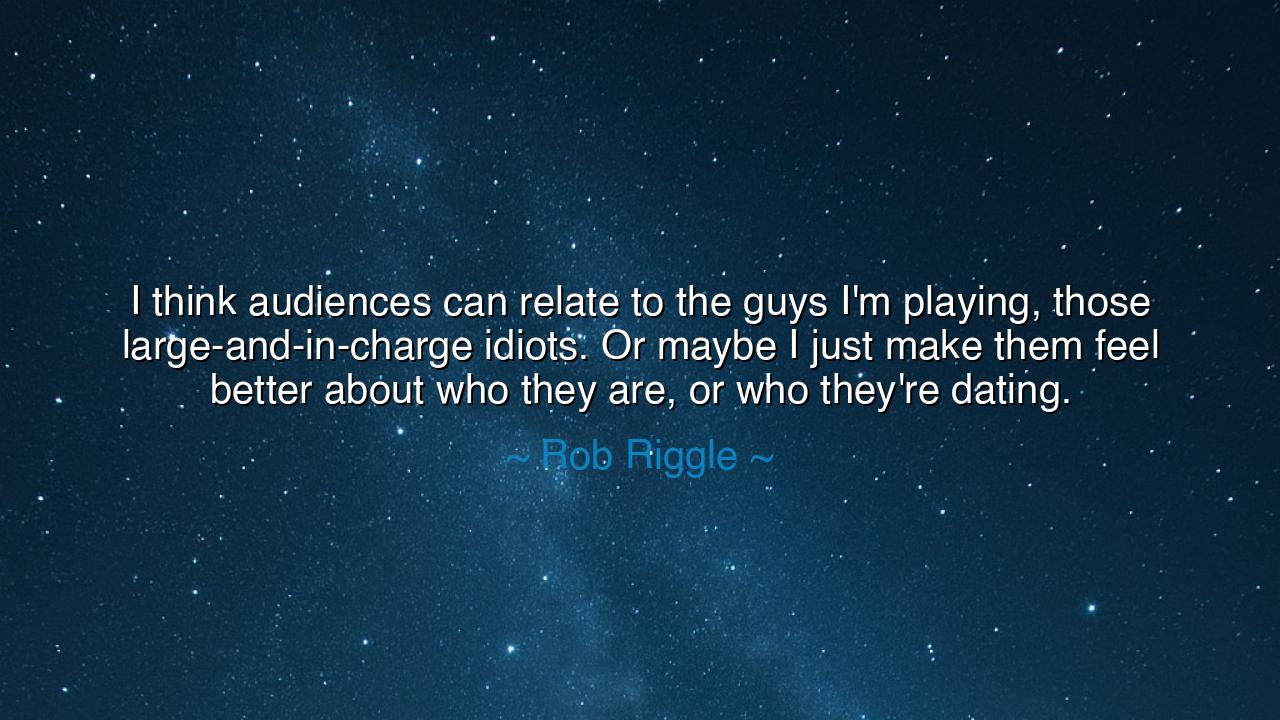
I think audiences can relate to the guys I'm playing, those
I think audiences can relate to the guys I'm playing, those large-and-in-charge idiots. Or maybe I just make them feel better about who they are, or who they're dating.






In the playhouses of our age, a jester-soldier steps forth and speaks true: “I think audiences can relate to the guys I’m playing, those large-and-in-charge idiots. Or maybe I just make them feel better about who they are, or who they’re dating.” Hear the modest trumpet in that line. It admits a mystery older than marble: laughter is a balm that cures by confession. We watch the swaggering fool and find our burdens lighter, because his blunders are our blunders with brighter lanterns held to them.
The ancients knew this medicine. In the theaters of Athens and Rome lived the miles gloriosus, the braggart soldier, helmet shining, wisdom small. His boasts rattled like empty shields, and the crowd exhaled its fear of arrogance with each laugh. Later, on English boards, Falstaff rolled in with appetite and bravado; he too was a large-and-in-charge idiot, a balloon of pride forever pricked by reality. Such figures stand between us and our own excess, teaching without sermon: “Be not as I am,” they say, “or at least be warned.”
Note the double grace the speaker names: first, people relate to the characters; second, they feel better beside them. The first grace is recognition—“I know that bluster; I’ve worn that mask.” The second is release—“If this noisy fool can be loved by the room, perhaps I, with all my dents and doubts, can be tolerated—maybe even cherished.” Thus the comic buffoon becomes a public confessional where shame loosens its grip and gentleness returns to the heart.
Consider a living parable from the drill-yard of history. When armies marched through mud and terror, the camp comic—half clown, half chaplain—would lampoon the overconfident officer, the supply snafu, the foolish order shouted as gospel. Men laughed, and in that laughing, stood straighter. Authority did not collapse; it righted itself. The idiot onstage saved real men from becoming idiots offstage. So too in our day: the stiff manager, the domineering date, the self-certain blowhard—all are made bearable by their stage-brother’s flaming antics.
There is tenderness hidden in the boast. To play these guys well, the actor must love them a little. Mockery without mercy curdles; compassion keeps the joke human. We laugh not only at the topple but at the tiny honesty inside the toppled man—the child who wanted to impress, the lonely heart beneath the loud shirt. This is why audiences return: the mirror is forgiving. It shows the stain, then hands us the cloth.
And what of who they’re dating? Comedy is a lantern for courtship’s missteps. The bossy beau, the over-curated suitor, the partner who treats love like a press conference—when these caricatures stumble under the spotlight, we learn to choose better, to demand tenderness over theater. A couple watching together may glance and smile: “Let’s not be that.” Such humor does not break romance; it repairs it by trimming vanity and watering kindness.
Take the lesson, then, and bind it to your door. When you meet the large-and-in-charge voice—in yourself, a friend, a leader—answer with a grin and a question, not a sword. Remember the old masks: miles gloriosus, Falstaff, the modern blowhard with a badge of nothing. Let laughter be a bridle for pride and a shelter for the awkward soul beside you. And if the night seems heavy with pretenders, seek the stage where the idiot is safely penned; come away lighter, more honest about who you are, gentler toward who you’re dating, and grateful for the fool who fell so we might walk a little wiser.






AAdministratorAdministrator
Welcome, honored guests. Please leave a comment, we will respond soon